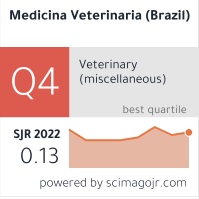Canine megaesophagus secondary to acetylcholinesterase inhibitors (chumbinho) intoxication: an unusual presentation
DOI:
https://doi.org/10.26605/medvet-v14n4-2125Palavras-chave:
carbamate pesticides, dilation, dogs, esophagus, toxicityResumo
Megaesophagus is a disease characterized by generalized esophageal dilatation, resulting from reduced or absent esophageal motility. It can be congenital or acquired and some common causes are persistent right aortic arch and myasthenia gravis. It can also be secondary to a variety of diseases, including intoxications. Although organophosphate poisoning is cited as a possible cause of megaesophagus, literature reports in dogs are rarely described. Such condition should have its importance emphasized, since poisoning by pesticides are relatively common in domestic animals and humans, whether accidently or intentionally. This study aimed to report the case of a dog which survived an episode of intentional pesticide poisoning and developed megaesophagus afterwards. The dog presented clinical signs of regurgitation around two weeks after surviving an intoxication episode. The diagnosis was based on clinical features and contrasted radiographic imaging (esophagography) using barium sulfate, which confirmed the diagnosis. Since no megaesophagus-related clinical signs were present before the intoxication episode, its relation to organic-phosphorus induced delayed neuropathy (OPIDN) was presumed. Unfortunately, the owner delayed seeking veterinary assistance and the dog’s condition deteriorated, despite therapeutic efforts, leading to death. Necropsy was not authorized. This case highlights the importance of monitoring canine patients which survived an intoxication episode and also draws attention to the illegal use of organophosphate compounds in Brazil and its impact in humans, domestic animals and wildlife.Downloads
Referências
Arnot, L.F.; Veale, D.J.H.; Steyl, J.C.A.; Myburgh, J.G. Treatment rationale for dogs poisoned with aldicarb (carbamate pesticide). Journal of the South African Veterinary Association, 82(4): 232-238, 2011.
Biasato, I.; Lanteri, G.; Guarda, F.; Capucchio, M.T.; Marino, F.; Briguglio, G.; Macri, F. Unusual combination of multiple vascular anomalies in a German Shepherd puppy with megaoesophagus. Anatomia, Histologia, Embryologia, 46(2): 216-219, 2017.
Caloni, F.; Cortinovis, C.; Rivolta, M.; Davanzo, F. Suspected poisoning of domestic animals by pesticides. The Science of the Total Environment, 539: 331-336, 2016.
de Siqueira, A.; Salvagni, F.A.; Yoshida, A.S.; Gonçalves-Junior, V.; Calefi, A.S.; Fukushima, A.R.; Spinosa, H.S.; Maiorka, P.C. Poisoning of cats and dogs by the carbamate pesticides aldicarb and carbofuran. Research in Veterinary Science, 102: 142-149, 2015.
Fracassi, F.; Tamborini, A. Reversible megaoesophagus associated with primary hypothyroidism in a dog. Veterinary Record, 168(12): 329b, 2011.
Hopper, K.; Beck, C.; Slocombe, R.F. Megaoesophagus in adult dogs secondary to Australian tiger snake envenomation. Australian Veterinary Journal, 79(10): 672-675, 2001.
Jokanovic, M.; Kosanovic, M.; Brkic, D.; Vukomanovic, P. Organophosphate induced delayed polyneuropathy in man: an overview. Clinical Neurology and Neurosurgery, 113(1): 7-10, 2011.
Kanemoto, Y.; Fukushima, K.; Kanemoto, H.; Ohno, K.; Tsujimoto, H. Long-term management of a dog with idiopathic megaesophagus and recurrent aspiration pneumonia by use of an indwelling esophagostomy tube for suction of esophageal content and esophagogastric tube feeding. Journal of Veterinary Medical Science, 79(1): 188-191, 2017.
King, A.M.; Aaron, C.K. Organophosphate and carbamate poisoning. Emergency Medicine Clinics of North America, 33(1): 133-151, 2015.
Lotti, M.; Moretto, A. Do carbamates cause polyneuropathy? Muscle & Nerve, 34(4): 499-502, 2006.
Mace, S.; Shelton, G.D.; Eddlestone, S. Megaesophagus in the dog and cat. Tierarztliche Praxis Ausgabe K Kleintiere Heimtiere, 41(2): 123-131, 2013.
Manning, K.; Birkenheuer, A.J.; Briley, J.; Montgomery, S.A.; Harris, J.; Vanone, S.L.; Gookin, J.L. Intermittent at-home suctioning of esophageal content for prevention of recurrent aspirative pneumonia in four dogs with megaesophagus. Journal of Veterinary Internal Medicine, 30(5): 1715-1719, 2016.
Ruiz-Suárez, N.; Boada, L.D.; Henríque-Hernández, L.A.; González-Moreo, S.; Suárez-Pérez, A.; Camacho, M.; Zumbado, M.; Almeida-González, M.; Del Mar Travieso-Aja, M.; Luzardo, O.P. Continued implication of the banned pesticides carbofuran and aldicarb in the poisoning of domestic and wild animal of the Canary Islands (Spain). The Science of Total Environment, 505: 1093-1099, 2015.
Tennakoon, S.; Perera, B.; Haturusinghe, L. Intentional poisoning cases of animals with acetilcholinesterase pesticide-carbofuran in Sri Lanka. Legal Medicine (Tokyo, Japan), Suppl 1: S500-S502, 2009.
Tinson, E.; Boller, E.; Davis, M. A suspected case of intermediate syndrome in a dog with carbamate toxicosis. Australian Veterinary Journal, 95(6): 201-206, 2017.
Downloads
Publicado
Como Citar
Edição
Seção
Licença
A Revista de Medicina Veterinária permite que o autor retenha os direitos de publicação sem restrições, utilizando para tal a licença Creative Commons CC BY-NC-SA 4.0.
De acordo com os termos seguintes:
Atribuição — Você deve dar o crédito apropriado, prover um link para a licença e indicar se mudanças foram feitas. Você deve fazê-lo em qualquer circunstância razoável, mas de nenhuma maneira que sugira que o licenciante apoia você ou o seu uso.
NãoComercial — Você não pode usar o material para fins comerciais.
CompartilhaIgual — Se você remixar, transformar, ou criar a partir do material, tem de distribuir as suas contribuições sob a mesma licença que o original.
Sem restrições adicionais — Você não pode aplicar termos jurídicos ou medidas de caráter tecnológico que restrinjam legalmente outros de fazerem algo que a licença permita.










